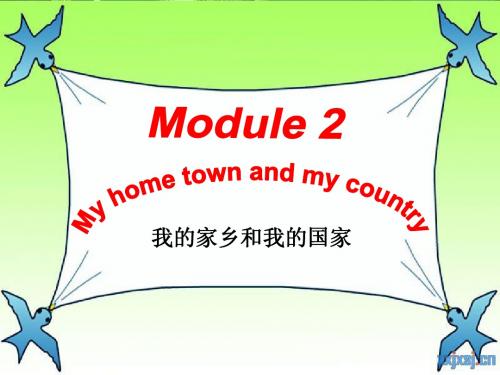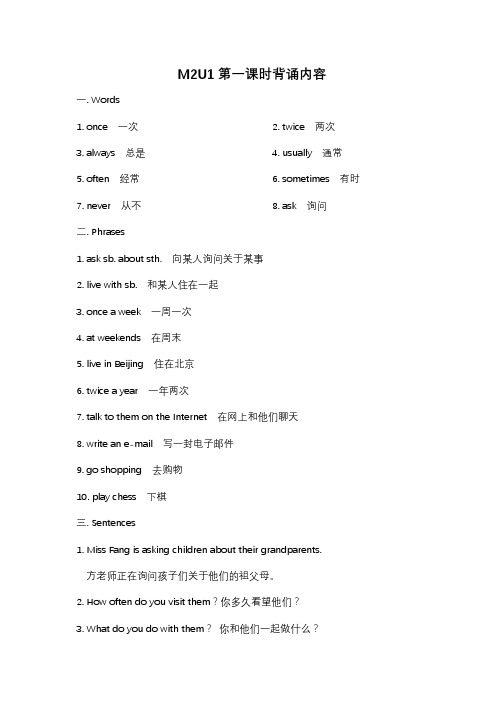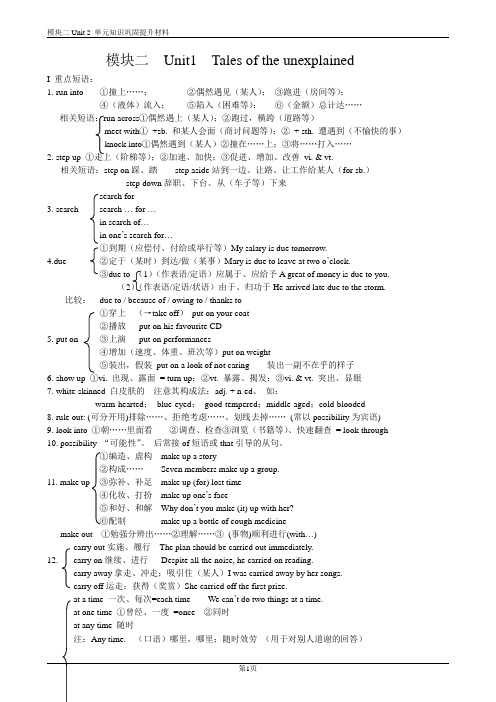路M2U1
2013外研版新版英语八年级上册M2U1

这条河很宽。
This is a _______ road. 这是一条宽广的道路。
than prep. 比 e.g. It’s cheaper to travel by
train than by air. 旅游坐火车比飞机便宜。
pretty adv. 相当地;非常;很 I’m pretty sure that he’ll say yes. 我非常确定他会说是。 pretty good 相当好;很好
1. Look at the pictures and talk about them. Use the words in the box to help you.
high hill population river wide
1. So it’s a newer city than Hong Kong? 2. It’s getting bigger and busier. 3. That’s larger than the population of many other cities in China. 4. Its streets are much wider and cleaner too. 5. It’s taller than many other buildings in Shenzhen.
spring. 春天天气渐渐变暖了。
New words:
•
• • • • • • • • •
• /ð æn; ð ən / prep. 比 than • /hɪl/ n. 小山;小丘 hill • /pɒpjʊ'leɪʃn / n. 人口,全体居民 population • ……人口是多少? What’s the population of • /waɪd/ adj. 宽的;宽阔的 wide • /'mɪljən/ num. 百万 million • /'bɪljən/ num. 十亿 billion • /'prɪti / adv. [主口] 相当的;非常 pretty • 很好! Pretty good! • /get/ v. 变成;成为 get
5A 牛津沪教版五年级上M2U1知识点(附默写纸)

一. Words1. once 一次2. twice 两次3. always 总是4. usually 通常5. often 经常6. sometimes 有时7. never 从不8. ask 询问二. Phrases1. ask sb. about sth. 向某人询问关于某事2. live with sb. 和某人住在一起3. once a week 一周一次4. at weekends 在周末5. live in Beijing 住在北京6. twice a year 一年两次7. talk to them on the Internet 在网上和他们聊天8. write an e-mail 写一封电子邮件9. go shopping 去购物10. play chess 下棋三. Sentences1. Miss Fang is asking children about their grandparents.方老师正在询问孩子们关于他们的祖父母。
2. How often do you visit them?你多久看望他们?3. What do you do with them?你和他们一起做什么?一. Words1. 一次_________________2. 两次_________________3. 总是_________________4. 通常_________________5. 经常_________________6. 有时_________________7. 从不_________________ 8. 询问_________________二. Phrases1. 向某人询问关于某事_________________________________2. 和某人住在一起_________________________________3. 一周一次_________________________________4. 在周末_________________________________5. 住在北京_________________________________6. 一年两次_________________________________7. 在网上和他们聊天_________________________________8. 写一封电子邮件_________________________________9. 去购物_________________________________10. 下棋_________________________________三. Sentences1. 方老师正在询问孩子们关于他们的祖父母。
高中英语词性转化M2U1整理

1.解释explain v. explanation n. unexplained(无法解释的,神秘的)adj.2.迷惑,疑惑puzzle n.(谜,疑惑,智力游戏)v. (使人感到疑惑)puzzlement n.puzzled adj.(感到困惑的) puzzling adj.(令人感到困惑的)3.事件,发生的事情incident n.incidental adj. (偶然发生的)4.消失,失踪disappearvi.disappearancen.appearv.(出现;似乎,显得)appearancen. (出现,露面)5.创造create v.(创造,封爵)creative adj.(有创造力的) n.(创意人士)creationn.(创造;创造物)creativity n. (创造力)creature n.生物,动物;人6.假定;认为assumev.assumption n.assumingadj.(自以为是的,傲慢的)conj.(假设)7.建造,构造,建设constructv.constructionn.constructorn.(建造者,建设者) constructiveadj.(构造上的;建设性的)8.发生occur v.occurrencen.(发生(率);出现(率);发生的事情)9.可能possible adj. possibility n.(可能性)possibly adv.impossible adj.impossibility n.10.侦查,侦探detect v.(洞察发现)detection n. detectable adj. (可发觉的)detectiveadj.(侦探的;适于探测的;用于探测的) n.(侦探)11.记者journalist n.journal n. (期刊,杂志)12.惊奇,惊愕amaze v. amazing adj.(令人惊奇的)amazed adj.(惊奇的)amazement n.13.证据evidence n. evident adj.(明显的) evidently adj.(毫无疑问地)14.伤害injure v.injured adj.(受伤的)injury n.(伤害,伤口)15.不予考虑;解雇;解散dismiss v. dismissal=dismission[不常用] n.dismissive adj.(拒绝的;轻蔑的,鄙视的)dismissible adj. (可解雇的)16.笑,大笑laugh v. laughter n.(笑声)17.热情,热心enthusiastic adj. enthusiasm n. enthusiast n.(热心人;热衷者)18.天文学astronomer n.(天文学家) astronaut n. (宇航员) astronomy n.(天文学)astronomical(天文学的,极大地)astronauticsn.(太空航天学)19.基地;基础;底部base n.(具象名词(基础))vt.以…为基础basic adj.basisn.(抽象名词(基础),主要成分;基准,基本原则)复数:basesbasement (n.) 地下室20.存在exist v. existing adj.(目前的,现存的)existence n.21.神秘mystery n.(神秘的人或事)mysteriousadj.22.问题question n. v.(问某人问题) questionnaire n.(问卷)23.标记号tick n.((表示正确无误的)记号;一会儿;赊账;钟的嘀嗒声)v. (发出滴答声;标以记号;激怒)ticket n.(票,入场券;标签;传票,交通违规的通知单;候选人名单)v. (售票;给…门票;加标签于,指派;对。
八年级上册外研版m2u1课文

主题:八年级上册外研版M2U1课文内容:1. 课文概述本课文是八年级上册外研版的第二单元第一课,主要讲述了一个发生在学校的故事。
故事的主要内容是关于一个叫杰克的男孩,他在学校遇到了一个叫莉莉的女孩,两人通过一连串的事件逐渐成为了朋友。
整个故事情节生动有趣,内容贴近学生生活,是一篇非常值得学生阅读的课文。
2. 课文分析此课文以简单直白的语言描述了学生在学校日常生活中的一些小故事,通过杰克与莉莉两个角色的对话和行为展现了人物之间的友情和互助,具有很强的教育意义。
通过细致的描写学校和课堂的情景,让学生们更好地了解了学校生活和班级情况,有利于增强学生的阅读兴趣和学习动力。
整篇课文所运用的语言通俗易懂,结构清晰,符合中学生的阅读习惯。
3. 课文核心思想通过杰克和莉莉的故事,课文告诉学生们:在学校生活中,应该互相帮助,友好相处。
无论是在解决问题还是在面对挑战时,团结互助都是很重要的。
课文也强调了学习的重要性,鼓励学生们要有积极的学习态度,勇于迎接自己的挑战。
4. 对学生的启示本课文所包含的核心思想对学生的启示是深远的。
通过阅读这篇课文,学生可以深刻理解到:友情和互助是非常重要的,学校生活需要团结互助才能更好的度过;学习的过程中也会遇到各种各样的问题和挑战,但只要勇敢面对,努力解决,就一定能取得成功。
结尾:八年级上册外研版M2U1课文是一篇内容生动有趣,语言简洁清晰的课文,适合学生阅读。
通过这篇课文,学生可以了解到学校生活中的人际关系和学习态度,受到很好的教育启示。
希望学生们能够通过阅读这篇课文,体会其中的深意,培养出积极向上的学习态度和团结互助的品质。
由于本课文具有很强的生活化和教育性,因此在教学中可以结合学生的实际情况,进行更深入的讨论和引导,以加深学生对课文的理解和吸收。
1. 引导学生讨论在学习本课文后,可以组织学生进行小组讨论,就课文中的主题展开深入的交流。
可以引导学生分析课文中的人物性格和行为举止,讨论他们的友情和互助之间的体验以及在生活中的体现等。
四年级上册m2u1

T: Excuse me. Where is _______Road?
Where is the Renrenle Supermarket ?
Point to the map and ask.
Practice it .
T: (CAI) show some pictures. Practice these sentences.
教学难点:
能熟练运用本课的目标句型进行问路和指路。
教
学
准
备
录音机,课件,单词卡
教
学
设
计
思
路
本课的设计思路是:用一首简单易学又与课文内容紧密联系的歌曲引入新课,激发学生的学习兴趣,同时在边唱边做中自然习得三个重要短语。接着边举卡片边说我住在吴灵路,你住在哪。引导学生回答。最后通过课件展示吴忠东区的地图,与学生练习本课的目标句型。最后出示书中的活动三,学生小组运用目标句型练习问路及指路。整个过程以创设情景为主,选择贴近学生生活实际的句子,激发学生的学习积极性。
能力目标:能熟练运用本课的目标句型进行问路和指路。
情感目标:在活动中激发学生的学习兴趣。
教
学
重
点
难
点
教学重点:
学习单词:live , road, excuse me,turn left, turn right, go straight on.学习目标句型:Excuse me. Where is the supermarket ?Turn left,Turn right, go straight on.能熟练运用本课的目标句型进行问路和指路。
Turn left.
新外研版五年级英语上册M2U1U2-课件

How much meat do you want?
kilo
half a kilo 半公斤
• 千克,公斤
• one kilo • half a kilo • two kilos • three kilos
• 1千克=2斤 • 半千克=1斤 • 2千克=4斤 • 3千克=6斤
How much cheese did you buy? One kilo.
Module 2 Unit 1 What did you buy?
go —— went meet——met come ——came buy——bought eat ——ate drop——dropped
可数名词: banana / apple /pear / orange / egg /book/ noodles…
Module 2 Unit 2 How much cheese did you buy?
How many apples did you buy?
apples
How many oranges did you buy?
oranges
How many bananas did you buy?
bananas
1kilo
cheese
How many 和how much 的区别
how many 和 how much 都可以用来提问 数量,译为“多少”,不过how many 提问 可数名词,后需用复数,而how much 提问 不可数名词,后面没有复数形式;另外,how much 还可以用来提问价钱,译为“多少 钱” 。
有古
一人
个云
在:
路“
上读
。万
”卷
从书
Hale Waihona Puke 古,至行今万
上海牛津五年级上词汇表M2U1

M2U1 Grandparents词组:1. how often 多久2. once a week 一周一次3. at weekends 在周末4. play chess 下棋4. twice a year 一年两次5. write an e-mail 写一封电子邮件6. on the Internet 在互联网上7. go shopping 去购物8. go to the cinema 去电影院9. do the housework 做家务10. three times 三次11. on one’s way to 在去…的路上12. knock at the door 敲门13. run away 逃跑14. go on an outing 远足15. flower show 花展16. Double Ninth cakes 重阳糕17. get together 聚在一起18. go on an outing (集体)外出游玩19. have a cold 感冒20. Little Red Riding Hood 小红帽21. play badminton 打羽毛球22. on weekdays 在平日句子:1. Who’s there? 是谁啊?2. Are you all right? I’m OK.你还好吧?我没事。
3. Do you live with your grandparents?你和你的爷爷奶奶住一起吗?4. How often do you visit your grandparents? I visit them once a week. 你多久拜访你的祖父母?我一周去拜访他们。
5. What strong arms you have!= How strong your arms are! 你有多强壮的手臂啊!。
外研社五年级英语上册M2U1-课件

UNIT 1 What did you buy ?
Sing a song
How many apples do you want? Do you want?Doห้องสมุดไป่ตู้you want? How many apples do you want? I want six red apples.
How much milk do you want? Do you want? Do you want? How much milk do you want? I want six bottles.
• 教学目标:
• (1)能听、说、读、写本节课的词语list, need, first, can, lost, how much ,cheese, any 。
• Homework: 1.读课文3遍。 2.写十个可数名词和十个不可数名词。 3.分别用How many和How much各造5个句
子。
天每
开个
放孩
;子
有的
的花
孩期
子不
是一
菊样
花,
,有
选的
择孩
在子
秋是
天牡
开丹
放花
;,
而选
有择
的在
孩春
➢ He who falls today may rise tomorrow.
检测(一)
• 看下列几幅图画,仿写句子。
What did you buy? I bought three bananas.
检测(二)
用How many和How much填空。 • 1.How many pears do you want? • 2.How much milk do you want? • 3.How many teachers do you want? • 4. How many books do you have? • 5 How much cheese do you want? • 6.How much juice do you want?
2024年外研版英语六年级上册M2U1-课件

Unit 1
There’s Chinese dancing.
Revision 复习
• Fill in the blanks.
• m_o_r_e_ th_a_n: __超____过____ • k_i_l_o_met_r_ _e_: _千__米__、__公__里___ • th_o_ _u_s_a_nd: _千___ • s_o_meth_i_ng: __某___事__物___ • m_a_p: _地___图__ • r_i_ _g_ht: _正__确__的__ • co_u_ntr_y_: _国___家___
绩 ,
八
分
方
法
。
愿
全
天
下
所
有
父
母
我们,还在路上……
• dancing 跳舞,舞蹈 • Chinatown 唐人街,中国城 • sometimes 有时 • shop 商店 • then 既然是这样,那么
Listen again and read sentence by sentence.
Guess!What’s the most important sentence?
Let’s chant together!
What’s this place?
It’s Chinatown!
Are there Chinatown in China? Why are there Chinatown abroad?
Listen again and underline the new words.
There are lots of Chinese shops and restaurants there.
Look and write. Then say.
五年级上沪教版M2U1默写

祖父母访问,参观一次;一旦总是国际象棋下棋通常两次有时因特网电影院羽毛球家务三次小红帽头巾在路上住宅狼敲,打敲(门、窗)砰砰声奇怪的听感冒强壮的拥抱锋利的猎人迅速地逃跑两倍节日在这一天传统的十月山脉花显示,演出玩的高兴一起穿着,衣物笑公寓树枝,分支刷子,画笔困惑,难题--方小姐正在询问孩子们有关他们的祖父母。
--你和你的祖父母住在一起吗?你多久去拜访他们。
你和他们做什么?--我不跟我的祖父母住在一起。
我一周拜访他们一次。
我总是在周末拜访他们。
我经常和我祖父下棋。
--我在周末也去看望我的祖父母。
--我们通常去公园。
--我的祖父母住在北京。
我两年去拜访他们一次。
我经常给他们写电子邮件。
有时我在网上和他们聊天。
--小红帽在去她祖母的路上。
一只狼看见了她。
他先跑到祖母家并敲门,咚咚咚。
--谁在那儿。
--你的孙女,小红帽。
--(打开门)救命!--奶奶,你的声音听起来很奇怪。
--哦,我感冒了。
--你的胳膊真强壮!--哦,我想拥抱你,亲爱的。
--你的牙齿真锋利!哦,我想吃你!--猎人很快来了,狼跑了。
--你还好吗?--我很好,谢谢!--登高节是中国传统的节日。
他通常在十月。
--在这一天,人们通常出去郊游或者爬山。
有时他们去看花展。
--人们在这个节日吃重阳糕。
重阳糕又甜又好吃。
--它也是老年人的节日。
在这一天,人们去看他们的父母和祖父母。
很多学生去老人院看望老人。
他们聚在一起玩的很开心。
--我爷爷带着一顶红帽子,有一只黑白相间的猫。
我们一起笑一起玩,在我去他家的时候,我们整天都很开心。
--我爷爷只有六十二岁。
他总是知道很多有趣的事情。
很容易看出来,他爱我,我也爱他。
M2U1

模块二Unit1 Tales of the unexplainedI 重点短语:1. run into ①撞上……;②偶然遇见(某人);③跑进(房间等);④(液体)流入;⑤陷入(困难等);⑥(金额)总计达……相关短语:run across①偶然遇上(某人);②跑过,横跨(道路等)meet with①+sb. 和某人会面(商讨问题等);②+ sth. 遭遇到(不愉快的事)knock into①偶然遇到(某人)②撞在……上;③将……打入……2. step up ;②加速、加快;③促进、增加、改善vi. & vt.相关短语:step on踩、踏step aside站到一边、让路、让工作给某人(for sb.)step down辞职、下台、从(车子等)下来search for3. search search … for …in search of…in one’s search for…①到期(应偿付、付给或举行等)My salary is due tomorrow.4.due ②定于(某时)到达/做(某事)Mary is due to leave at two o’clock.③due to (1)(作表语/定语)应属于、应给予A great of money is due to you.(2)(作表语/定语/状语)由于、归功于He arrived late due to the storm.比较:due to / because of / owing to / thanks to①穿上(→take off)put on your coat②播放put on his favourite CD5. put on ③上演put on performances④增加(速度、体重、班次等)put on weight⑤装出,假装put on a look of not caring 装出一副不在乎的样子6. show up ①vi. 出现、露面= turn up;②vt. 暴露、揭发;③vi. & vt. 突出、显眼7. white-skinned 白皮肤的注意其构成法:adj. + n-ed。
牛津英语四上M2U1知识点归纳

4A Tips for M2U1Class_______ Name_________ No. ____ Signature_______一、新单词和词组二、新句子1. That’s my uncle. He is my father’s brother. He is a police officer.2. On Mid-autumn Day, Jill and his parents visit her grandparents.3.Let’s have some mooncakes and watch the beautiful moon in the sky.4. Who’s that lady in the long red skirt?5. Who’s this man? He’s my uncle. He’s Wang Rong’s father. He can dive.6. Do you have any brothers and sisters? No, I don’t, but I have a cousin.7. How many uncles and aunts do you have? I have one uncle and two aunts.三、语法知识:on, in, at的区别1. 表示时间时,注意一下用法:1)in表示较长的时间段。
▲常见的以in表示时间的短语有:in the morning 在早上in February 在二月份in 2018 在2018年in summer 在夏天in the afternoon 在下午in August 在八月in two weeks 在两周后In five minutes 5分钟后eg: We came back in the evening. The days are cold in winter.2.)on表示特定的日子、具体的日期、星期几、节日以及具体某一天的上午下午晚上等。
外研版九年级英语上册教案M2U1

授课教师:授课时间:
课题
Unit1 My family always go somewhere interesting as soon as the holiday begins
课型
listening and speaking
教学内容
分析
本课是本模块的第一课,通过听、说的练习使学生初步掌握本模块有关节日的话题功能和时间状语从句的语法要求,起到引领作用。本课前两个活动向学生传达了同一节日在不同的国家的庆祝时间及方式都不同的信息,拓展了学生的视野,同时也为下面的文化学习奠定了基础。接下来的对话中,托尼、贝蒂、玲玲和大明一起谈论了国庆节这一话题,他们分别谈论了中美两国国庆节的由来,不同的庆祝方式以及家人的节日活动安排。学习对话的过程中,学生要注意日期的表达方式序数词的构成和朗读方式,这也是本模块语音部分着重要训练的内容。
1.People have celebrated the National Day _____ then.
2.We’ll stay there______the end of the holiday.
3.______we’re staying with our friends, we’re going to spend one day in Qingdao.
Ss: Answer the question, then read the text to check their answer.
T: Compare answers as a class.
3. Listen and complete the table
T: Well done. Can you tell me the difference between China’s National Day and Independence Day? Let them read the table then listen to the recording.
2024年外研社三年级英语上册M2U1---课件

Do you remember?(你还记得吗?)
I am Ms Guo. 我是郭老师。
New teacher
She is Ms Smart. 她是斯马特女士。
3.Listen and say.
4.Practise. (练习)
Homework(家庭作业) 周二:
课本8页活动2、活动3录音跟
----How are you,Sam? ----I’m fine, thank you./ Fine, thank you.
Sing the song.
Hello,Hello • Hello,hello,how are you? • I'm fine,I'm fine and hello to you. • Goodbye, goodbye ,goodbye to you. • Goodbye, goodbye ,goodbye to you.
Review复习
----Hello, I am Sam. ----Hello, I am Daming./ Hi, I am Daming.
----Goodbye, Sam. ----Goodbye , Daming. /Bye-bye, Daming.
----Good morning, Sam. ----Good morning, Daming.
• boy girl boys girls • A: How are you?(另外一种回
答)
B: I’m fine. And how are you?
A: I’m fine too. Thank you.
Ms 女士
She is Ms Hong. 她是红太狼女士。
Mr 先生
He is Mr Hui. 他是灰太狼先生。
外研版四年级上册M2U1 she's reading a book.

当表示正在做的动作或事情时,要在动词原形的后面加ing。 以不发音的e结尾的单词,去掉e加ing.
read watch play take swim run
-------------
reading watching playing taking swimming running
Game:心有灵犀
Who are they in these pictures?
What are they doing in these pictures?
(这些照片里,他们正在做什么?)
Watch and answer
reading She's _________ a book.
taking pictures. He's ________
外研版四年级上册 Module 2 Unit 1
She's reading a book.
威海市千山路小学 杜娟
I like playing basketball.
What sport do they like?
(他们都喜欢什么运动?)
What sport do they like?
(他们都喜欢什么运动?)
I like playing football ______.
I like playing football.
playing basketball . She likes ______________
He likes swimming.
running We like ______.
注意模仿语音、语调。
Let's enjoy a chant!
Homework
必做:
1.熟读M2U1 一、二两部分,并理解意思。 2.有韵律地朗诵M2U2 第一部分。
M2U1单词精研备课资料(译林牛津版英语高一)

M2U1 单词精研备课资料(译林牛津版英语高一)1 assume vt.假设,设想,认为(教材P3)...,she assumed that Kelly was having a bad dream,and sent her back to bed.她认为凯莉做恶梦了,把她打发回床上睡觉了。
归纳拓展①(朗文P103)It is assumed that they will eventually join the EU.人们认为他们最终会加入欧盟。
②(牛津P104)I had assumed him to be a Belgian.我本以为他是比利时人。
③Assuming (that) he’s still alive,how old would he be now?假定他还活着,现在有多大年纪了?2 occur vi.发生;想到;出现;存在(教材P3)Mr.Foster was working that night on his road construction job,and was not home when these events occurred.当那些事情发生时,福斯特先生那晚正在修路没回家。
归纳拓展【辨析】 happen,occur,take placehappen 常用来表示“偶然,碰巧”,而且多指整个情况,这时不能用另外两个词代替。
occur 多用来指具体事情的发生,虽然也可指偶然性,但与happen相比程度较弱。
take place 作“发生”解时较为正式,不带有偶然之义,并经常用来指经事先安排的事情。
①It didn’t occur to me that there’d be a big festival on at the same time as my holiday.我原先没想到我度假的同时那里刚好要庆祝一个盛大的节日。
②(朗文P1412) I washed it in the water-it never occurred tome to check the label.我用水把它洗了--根本没想到看一下标签。
M2U1知识点梳理(英语)

4B Oxford Primary English Module2 Unit 1 Look at the shadow!知识点梳理◆核心单词◆核心短语(需要家默)◆核心语法:1. 一般现在时(第三人称单数)的一般疑问句结构Does + 第三人称单数+动词原形 ...?肯定回答:Yes, he/she/it does.否定回答:No,he/she/it doesn’t.2. There be 句型的就近原则3. Would you like to...? 是表示礼貌的请求、提议或邀请,而不是提出疑问。
1)Would you like + sth.(事物)?Eg: Would you like some eggs? 你想要来一些鸡蛋吗?2)Would you like to do?Eg: Would you like to play with us? 你想和我们一起玩吗?应答句:同意、接受别人的邀请:1)需要某物:Yes, please. /Certainly./Yes,thank you.2)做某事:Sure, I’d love to./ Yes, I’d like to.不同意、不接受别人的邀请:1)不需要某物:No,thanks./No, thank you.2)不做某事:Sorry, I'd love to, but....(I must/should do...我必须/需要做...)Eg: Sorry, I'd love to, but I must finish my homework first.对不起我也想去的,但是我必须先完成我的回家作业。
4. Let+宾格+动词原形例如:Let's+动词原形Eg: Let’s play football together.例如:Let me +动词原形Eg: Let me see.(引申为:让我想一下。
)5. What do/does sb. need....? 某人需要什么东西吗?sb. need/needs ... 某人需要...。
- 1、下载文档前请自行甄别文档内容的完整性,平台不提供额外的编辑、内容补充、找答案等附加服务。
- 2、"仅部分预览"的文档,不可在线预览部分如存在完整性等问题,可反馈申请退款(可完整预览的文档不适用该条件!)。
- 3、如文档侵犯您的权益,请联系客服反馈,我们会尽快为您处理(人工客服工作时间:9:00-18:30)。
【外研版】七年级上Module 2导学案
Unit 1 I can speak English.
执笔人:李家营中学路广丛
学校:姓名:班级:
【课前预习学案】
一、预习目标
1.熟悉本课出现的生词的拼读
2.了解课文内容
3.了解can的用法
二、温故而知新
1、根据音标写出下列单词。
2、Fill in the blanks.
1) Betty is from America. She _____ (can)play football, but she _____ (can)speak Chinese.
2) Tony is from England. He can play __________ (piano) and table tennis.
3) Daming can play _________(table tennis) very well.
4)Lingling’s parents can speak English.(变否定句)
Lingling’s parents _______ speak English.
【课中实施学案】
一、学习目标(认准目标,耐住性子,一步一步往前走,加油!)
1. play构成的动词词组和职业、场所。
2. 掌握动词can表示能力的肯定、疑问及否定形式。
4. 进行涉及父母、朋友的职业及擅长活动的介绍
二、自主学习(相信自己,一定能行!)
Match the words with the pictures . (Part 1)
(一)听力训练
1.Listen and finish part
2.(自主完成)
2.Listen and check the true sentences.
1) Lingling can play football. ( )
2) Lingling can’t play tennis. ( )
3)Lingling can’t play basketball ( )
4) Lingling can ride a horse. ( )
5) Lingling can swim. ( )
3、Listen again and Finish Part 4.
4、Read after the tape and answer the questions.
1)Betty is ________ years old. 2)She can spesk__________.
3) Tony is from__________. 4) He can’t ___________.
三、合作探究
1、Look at the information. Ask and answer. (Activity 7)
Eg: A: Can Betty speak English? B: Yes, she can.
A: Can Tony swim? B: No, he can’t.
2、Work in pairs. Make a survey. Find out what your friends can do. (Activity 8)、
nam
e
spor
t
(根据调查结果,整理成一段对话。
Eg. Daming can swim, but he can’t ride a horse.完成后,每组派代表到讲台上展示)
四、精讲点拨(重点知识,重点把握)
1、welcome …to…“欢迎…来”
Eg:Welcome all of you to our city. 欢迎大家来到我市。
2、play + 球类play + the + 乐器
Eg: play basketball /tennis/ table tennis
play the piano
3、can/can't + 动词原形
肯定句I can swim. 否定句I can't swim.
一般疑问句Can you swim? 肯定回答Yes, I can. 否定回答No, I can't.
Practice将下列句子变为否定句或者第三人称形式
I can dance. I can sing. I can play football.
I dance. I sing.I play football.
He/She dance. He/She sing.
He/She play football.
4、清辅音/p/ /t/ /k/
浊辅音/b/ /d/ /g/
五、课堂小结(会思考、会总结,才会有收获哦!)
通过本节课的学习,你学到了什么?
六、当堂检测
一.英汉互译:
1.打篮球_________________ 5. ride a bike ____________________ 2.弹钢琴_________________ 6.international school _____________ 3.骑马_________________ 7.play table tennis ________________ 4.打网球_________________ 8.speak English __________________二.根据汉语完成句子:
1.我不会讲英语。
I _____ ______ English.
2.他可以在学校踢足球。
He _____ ______ ______ at school.
3.你会游泳吗?是的,我会。
- Can you swim?
_ _____, _______ ______.
4.你会打网球,而贝蒂不会。
You can _____ ______, but Betty _______.
【课后拓展学案】
1) 复习巩固:记忆单词,背诵对话,掌握语言点。
2) 预习任务:预习Module1 Unit2.
3) Homework: 如果你是Betty 或是Tony,请向你的新同学和老师介绍一下你自己吧!记住,别忘了自己会做和不会做的事情。
附知识点学习
1. 情态动词can的用法
1) 表示能力(如体力和脑力方面),意为"能;会"等。
例如:
Can you speak English? 你会讲英语吗?Can you play the piano? 你会弹钢琴吗?
2) 表示请求或允许,多用在口语中,意为"可以;能"等。
用于疑问句中用来提出要求,用于否定句表示不允许。
例如:
Can I help you? 我能帮助你吗?
You can't play basketball. 你不能玩篮球。
Can you...?"请你……好吗?"表示说话人的请求;Can I...?"我可以……吗?"用来征求对方是否允许自己做某事。
如在句末加上please一词就显得更有礼貌了。
例如:Can you help me, please? 请你帮助我好吗?
3) 表示可能。
例如:
He can be at home now. 他现在可能在家。
The moon can't always be full. 月亮不可能常圆。
4) 表示怀疑。
在表达此意时,只能用于一般疑问句中,带有感情色彩。
例如:
Can it be true? 那会是真的吗?
5) 句式变化如下:
a) 在变否定句时,直接在我后加上"not",可缩写成can't或cannot, 但不能写成cann't。
例如:
He can swim. →He can't swim.
Emma can see the pen on the desk.→Emma cannot see the pen on the desk.
b) 在变一般疑问句时,把我直接移到主语前(原主语的首字母改成小写,第一人称应变为第二人称)即可。
例如:
I can see an orange on the table. →Can you see an orange on the table?
其回答可用Yes, OK或Certainly等作肯定回答;用No或Sorry等作否定回答。
例如:
-Can you look after my books, please? 你能照看一下我的书吗?
-OK. 可以。
用Certainly回答。
此时语气更为肯定。
例如:-Can I see your guitar? 我能看看你的吉它吗?-Certainly. 当然可以。
